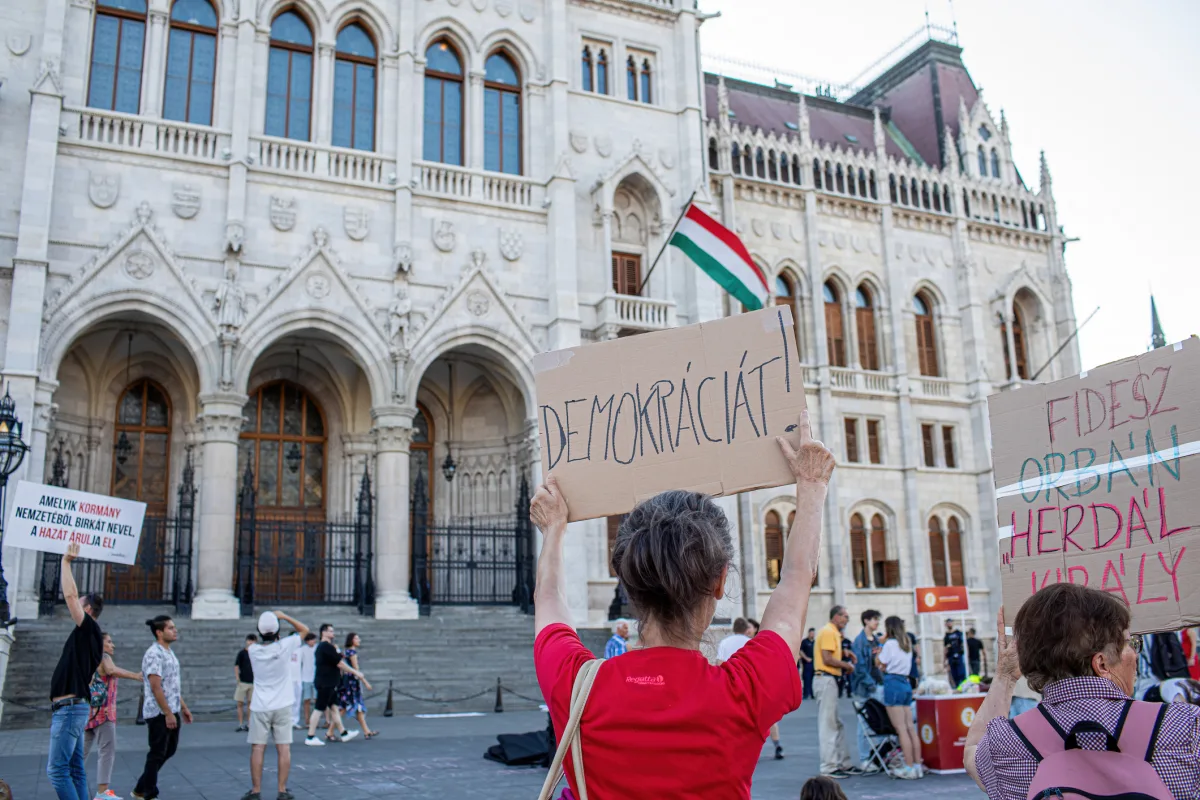In May 2025, as jubilant crowds waved Romanian and EU flags outside Bucharest City Hall, Nicușor Dan proclaimed that, “from tomorrow, Romania begins a new stage” after his stunning presidential victory over hard-right nationalist George Simion.
What made Dan’s triumph particularly remarkable was not just his defeat of populism in an age of rising authoritarianism but his origins: Dan, a 55-year-old mathematician, rose to prominence as a civic activist fighting against illegal real estate projects.
The new Romanian president exemplifies a broader phenomenon across the developing world. Dan founded Asociatia Salvati Bucurestiul in 2006 and has spent years battling to preserve architectural heritage and green spaces. His journey from NGO founder to president illustrates both the potential and the peril facing civil society organisations today.
The last line of defence
As democracy retreats across the globe, civil society organisations have found themselves cast in the role of democracy’s last line of defence. From the streets of Tbilisi to the corridors of power in Budapest, non-governmental organisations (NGOs) are increasingly the sole guardians of democratic norms in nations where the press has been captured or cowed.
Paradoxically, however, these very organisations that once heralded freedom in post-communist states now face systematic campaigns to discredit and destroy them.
The importance of NGOs to democratic governance cannot be overstated. They help the public keep an eye on whether politicians are misusing public money or breaking the law. They allow the public to get organised and make their opinions known to our representatives, for example, through petitions or peaceful protests. And they take governments to court when they try to take away our rights or steal our taxes.
In developing countries, where state institutions are often weak or compromised, NGOs serve as crucial intermediaries between citizens and government, promoting transparency, accountability, and civic engagement.
The post-communist vanguard
The modern conception of NGOs as democracy’s champions was forged in the crucible of post-communist transformation. American donors, including private ones, such as George Soros’s Open Society Institute, played the most prominent role in this process as the earliest and most significant sources of civil society assistance in postsocialist countries.
When the Berlin Wall fell, Western donors recognised that building democratic institutions required more than just constitutional frameworks—it demanded vibrant civil societies capable of holding power to account.
These organisations proved their worth during the democratic transitions of the 1990s and 2000s. NGOs looked attractive as both partners and recipients because they cost far less than traditional government-oriented development.
More importantly, they delivered results. From election monitoring in Ukraine to anti-corruption campaigns in Poland, NGOs became the backbone of democratic consolidation across Eastern Europe and the former Soviet Union.
Democracy watchdogs
Today, as press freedom erodes globally, NGOs have become even more vital to democratic governance. They serve multiple crucial functions that distinguish them from traditional media outlets.
First, they provide sustained advocacy on specific issues, maintaining pressure on governments long after news cycles have moved on. Second, they possess technical expertise that enables them to scrutinise complex policy areas, from electoral law to public finance. Third, they can mobilise citizens for collective action in ways that individual journalists cannot.
Election monitoring involves the observation of an election by one or more independent parties, typically from another country or NGO. The monitoring parties aim primarily to assess the conduct of the election process based on national legislation. This function has become particularly crucial as authoritarian leaders worldwide have perfected the art of electoral manipulation whilst maintaining a veneer of democratic legitimacy.
The Carter Center alone has deployed 125 complete and limited observation missions in 40 countries since 1989, establishing professional standards that have been adopted by numerous other organisations. Meanwhile, the Global Network of Domestic Election Monitors connects over 245 regional networks and individual nonpartisan citizen observation groups worldwide, creating a web of accountability that transcends national boundaries.
‘Foreign agents’
The very effectiveness of NGOs has made them targets for authoritarian regimes. The most insidious weapon in this assault has been the proliferation of ‘foreign agent’ laws pioneered by Russia and now spreading across the globe.
The archetypal foreign agent law is Moscow’s 2012 legislation regulating the activities of non-commercial organisations performing the function of ‘foreign agents’. Adopted just months after Vladimir Putin’s return as president of Russia, the law was a foundation for the Kremlin’s entrenchment of authoritarianism.
These laws operate through a combination of stigmatisation and bureaucratic strangulation. In Russia, the term foreign agent’ can be interpreted by the public only as ‘spy’ or ‘traitor’. To date, Russia’s Justice Ministry has designated 158 groups as “foreign agents,” courts have levied staggering fines on many groups for failing to comply with the law, and about 30 groups have shut down rather than wear the ‘foreign agent’ label.
The contagion has spread alarmingly across Europe. Hungary’s Viktor Orbán has been particularly aggressive, with his government passing laws that force NGOs to label themselves as ‘foreign-funded’, seeking to discredit their work and turn people against them. Despite the European Court of Justice ruling such legislation incompatible with EU law, the draft law can still be amended during the subsequent parliamentary debate; however, it is expected to sail through unchanged, given the government’s large majority in parliament.
The scope of these attacks extends beyond legal frameworks. In Hungary, Orbán has explicitly targeted civil society organisations, promising to ‘shut off the Soros network’s financial taps’ and achieve ‘full elimination of the Soros network’. Intelligence agencies have been tasked with compiling blocklists of so-called foreign agents, representing an unprecedented weaponisation of state security apparatus against civil society.
The far-right’s narrative
The demonisation of NGOs represents a broader far-right strategy to delegitimise democratic institutions. By framing civil society organisations as tools of foreign manipulation, populist leaders tap into deep-seated anxieties about national sovereignty whilst simultaneously undermining the very organisations that could expose their own corruption and authoritarianism.
The state’s alleged need for transparency as its primary purpose can, therefore, be effectively addressed through existing legislation regulating NGOs, yet these laws persist because their true purpose is not transparency but control. Such laws contradict the commitments of these countries under international human rights law, yet they continue to proliferate.
The rhetoric employed reveals the true intent. Donors like to draw a purely altruistic picture of their funding activities as if all they ever wanted was to alleviate suffering in Georgia, Moldova, or Malawi, but authoritarian governments deliberately distort this narrative to suggest sinister motives. The success of this strategy is evident in its replication: in Slovakia, the far-right and pro-Russian Slovak National party (SNS), currently part of the governing coalition, proposed a similar law in April, targeting mainly NGOs working on disinformation, human rights or political accountability.
The Trump effect
The return of Donald Trump to the American presidency has emboldened authoritarians worldwide to intensify their attacks on civil society. The Trump administration’s rhetoric and its decision to freeze foreign aid have contributed to strengthening hostile narratives already present in ‘foreign agent laws’ in Central and Eastern Europe and have emboldened governments in their efforts to undermine these organisations publicly.
This creates a vicious cycle: as Western support for civil society diminishes, authoritarian governments feel emboldened to crack down harder on NGOs, which in turn weakens the very organisations that could document and resist democratic backsliding.
The timing is particularly ominous, as those countries that have introduced ‘foreign agent’ laws have either ‘closed’ or ‘obstructed’ civil society space.
The sustainability question
The attacks on NGOs have exposed a fundamental vulnerability in the civil society ecosystem: excessive dependence on foreign funding.
Donations from international sources make up over 95 per cent of the financial sources of support for most NGOs in many developing countries. This dependency provides authoritarian governments with a convenient narrative to attack these organisations whilst also creating genuine sustainability challenges.
Global South NGOs’ reliance on Western donors hinders the growth of self-sustaining civil societies, creating a legitimate critique that authoritarians exploit for illegitimate purposes.
The challenge is developing indigenous funding mechanisms that can support civil society work without falling prey to government interference or co-optation.
Towards resilience
Civil society organisations need to continue to adapt and evolve. The key to survival lies in building broader coalitions, diversifying funding sources, and demonstrating tangible value to ordinary citizens. If more of their leaders, such as Romania’s Dan, could become president, it wouldn’t hurt.
The international community must also step up its support. Firm commitments can also leverage government and community support to provide the resources, opportunities, and spaces needed to foster a vibrant civil society. This includes not only financial support but also diplomatic pressure on governments that attack civil society organisations.
The battle for civil society is ultimately a battle for democracy itself. NGOs enable citizens from different backgrounds to learn to work together and build the skills, relationships, and trust necessary for good government. When these organisations are weakened or destroyed, the foundations of democratic governance crumble.
The irony is stark: the very organisations that helped build democracy in post-communist Europe are now fighting for survival against the same authoritarian tactics they once helped overcome. Their fate will determine whether democracy can survive the current wave of authoritarianism or whether we are witnessing the twilight of the liberal democratic order.
Photo: Dreamstime.







